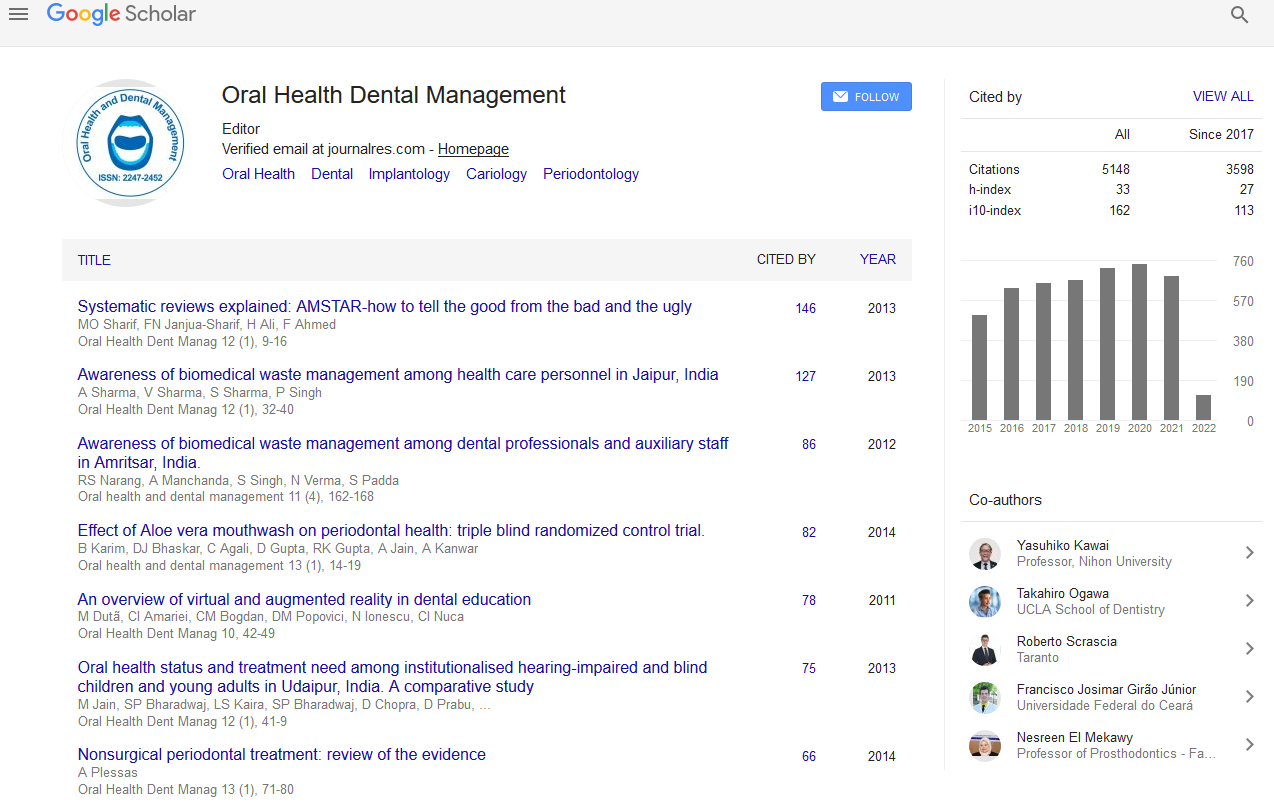Indexed In
- The Global Impact Factor (GIF)
- CiteFactor
- Electronic Journals Library
- RefSeek
- Hamdard University
- EBSCO A-Z
- Virtual Library of Biology (vifabio)
- International committee of medical journals editors (ICMJE)
- Google Scholar
Useful Links
Share This Page
Journal Flyer

Open Access Journals
- Agri and Aquaculture
- Biochemistry
- Bioinformatics & Systems Biology
- Business & Management
- Chemistry
- Clinical Sciences
- Engineering
- Food & Nutrition
- General Science
- Genetics & Molecular Biology
- Immunology & Microbiology
- Medical Sciences
- Neuroscience & Psychology
- Nursing & Health Care
- Pharmaceutical Sciences
Intra-pulpal and sub-surface temperature rise during tooth irradiation with 810 nm diode laser: An in vitro study
7th Global Dentists and Pediatric Dentistry Annual Meeting
March 31- April 01, 2016 Valencia, Spain
Marwa Abdelaziz, Firas Khouja, Tissiana Bortolotto and Ivo Krejci
University of Geneva, Switzerland
Posters & Accepted Abstracts: Oral Health Dent Manag
Abstract:
This in vitro study evaluated the pulpal and subsurface temperatures during tooth surface irradiation with different settings of 810 nm diode laser. The elevation of pulpal and dentinal temperature during irradiation was measured with the aid of thermocouples positioned in the centre of the pulp chamber (n=30) and in the centre of a prepared 1.5 mm deep coronal cavity (n=30). Irradiation was performed three times on each sample with different exposure settings. A temperature increase of 3.5°C was regarded as critical value for pulpal heath. Results were analyzed with one-way ANOVA and Duncan post-hoc tests. In addition, micro-morphological investigation by digital microscopy was carried out for the irradiated and non-irradiated tooth surface. Measurable temperature increase within the pulp chamber (�?PT) and the subsurface dentin (�?DT) were observed with all laser settings tested. The highest recorded �?PT & �?DT were 3.1°C and 8.5°C, respectively. Delivery mode, beam diameter and exposure time were of influence on temperature rise. Digital microscopy did not show any alteration of the dental surface structure by all parameters tested. From the thermal point of view, under the conditions of the present study the application of 810 nm diode laser on the outer surface of the tooth at 1 W in the continuous mode and at 5 W in the pulsed mode for two cycles of 30s each proved to be safe.
Biography :
Marwa Abdelaziz graduated from the University of Geneva in 2010 and since she has been working simultaneously in a private practice as a general dentist and at the University of Geneva (Division of cariology, endodontlogy and pediatric dentistry) teaching students and conducting research. In 2013, she started a PhD project supervised by University of Amsterdam (ACTA) and the University of Geneva. The subject of the research is focused on non-invasive diagnostic methods and non-invasive treatment options of initial carious lesions like infiltration and sealing.
Email: marwa.abdel@unige.ch

